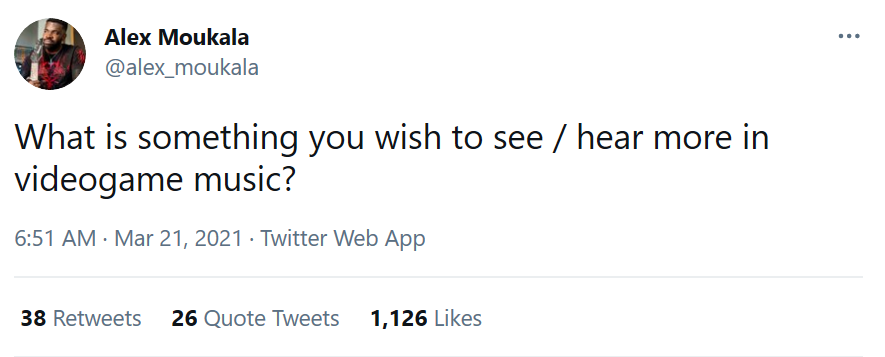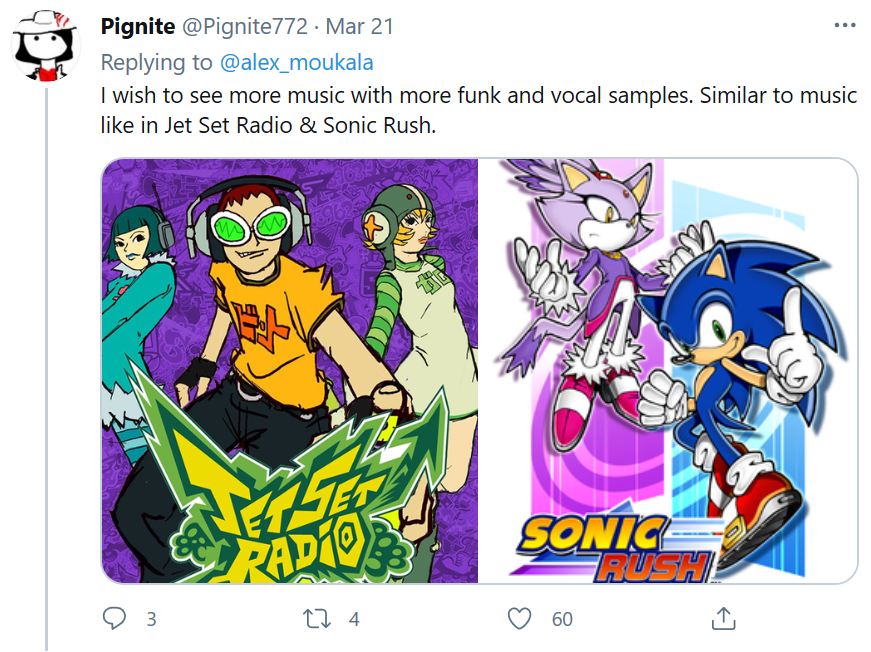
Ha, the classic question. If you look at most games of the past twenty years, you will find two genres in videogame music: orchestra and bleep bloop. There are also basically two feels in videogame music: serious as fuck and whimsical as hell. Yes, you might have the quirky Lo-Fi Hip-Hop loop in the in-game’s shop or the jazzy nostalgic music in the game menu but overall let’s be real: videogame music follows the most rigid aesthetic and in general never really expanded, ever.
Which is why we’re collectively wondering regularly about what videogame music can be. Short answer: everything.
I grouped the most interesting —most liked— answers to Alex’s question.

That’s definitely out of the usual. There is some in Guacamelee but sadly they added 8bit stuff (I have a hard time with SQUARE leads, always had) and electronica on top of it.

Two things: boldness of an aesthetic statement VS game development ultra pragmatism
Game development is insane, with a million things to deal with. Aesthetic boldness is usually expressed through graphics, while music and sound design will be aesthetically “following”, that is, they will be pretty much as boringly expected as possible. Let’s take the example of a “serious” space-themed game. You will have Vangelis type of background music because that’s what everyone in the team will want and settle on. Because it is a safe choice. Games are so complicated to make that they become even more a team’s baby than any other creative output I’ve seen. Therefore taking risks, making bold aesthetic statements like adding some jazz that only two folks in the team feel, will not be done. Even if the public might absolutely love it.
It doesn’t matter that in this example you could say “Cowboy Bebop did it and it works so wonderfully people still talk about it 20+ years later”. If the lead programmer or creative director believes that it’s wrong or that it would only work in anime (or that he/she hates anime), then it’s not happening. There’s never much iteration on music genres in games, if at all. I mean probably at Nintendo, but you know by now that they are the exception (and the metric we’re still humbly trying to match).

SO TRUE. All the technical excellence and overall quality of music can be easily forgotten if you can’t hum something you heard sometimes for hundreds of hours. Nintendo is the King at this. I can hum many of their leitmotif coming to me randomly, decades later (water level in Mario64, I don’t know why). Nintendo always cared.
Music is never thought as an integral part of western game development, it’s always just a layer put on top. Therefore balancing things out cannot be done because it is already far too late and game designers have already moved on to (way bigger) problems. Western game development doesn’t care about music like that. Just slap a big composer name if you can, fade out the music if you can (or just abruptly end it), done. I wish it would change, for sure.

This happens actually quite a lot, it’s just that most people don’t notice :) We have complex game audio engines today (FMOD-Wwise) taking care of that. Why is it usually a bit dull or in the background? Because sudden changes in audio is not a good feeling nor good design. Our ears simply don’t like that. It needs to flow and be fluid. Now, wouldn’t it be cool if we could mute/unmute tracks within the music? Yes it would, but it’s asking the game audio engines to deal with huge amounts of audio data to move around very quickly and, games being EXTREMELY sensitive to anything impairing performance, it’s basically never worth it. Could we do that with less data, with say a MIDI track muting/unmuting MIDI channels? Yes, but it’s still a lot of work and a complex one: it’s a blend of music composing, game integration and iteration with level design to see what works best and what does not. It’s also an aesthetic issue: not every music genre works well with MIDI-only, and telling composers to not worry about their raw audio output is heretic.
The world of audio and music likes to stay rigid and is quite often, conservative. Which is very much the opposite of how games are developed: it’s all about finding new ways to do something better, hacking and tweaking your ways through it.

GIRL. I wish that too! I thought it was obvious that this was needed. I can’t believe —yet it makes sense that we still mention twenty year old games thanks to their music.
Funk is inherently a playful genre of music that Japanese composers have rightfully started to incorporate in their 80s and 90s games and on (I can’t remember which arcade game has straight James Brown samples in it, but yeah). Funk became the backbone of R&B which became known as K-Pop in the late 2000s, go figure.
It has to be said: in the western world of game development, composing that type of breakbeat/funky stuff music is not really considered composing. You compose music only if there are cellos and timpanis otherwise you still compose music but. Anyway.
Vocal samples are to me one of the most iconic and unique aspect of game audio. It’s what made arcades so amazing: those funny, energetic sounding machines, that digital laugh, the corny lines, blasting in sync with flashing lights and screens. It’s all fun and part of the culture. Who doesn’t have a “it’s me Mario” or a “Heavy Machine Gun!” popping up in their minds from time to time, I know I do.

Right! It’s super hard to do. Not so much to sync audio and gameplay, though that can be tricky, but to make a rhythm-based gameplay interesting and not feel like a fad after two minutes. Also it needs to never break and that’s where things usually fall apart. If few games have done that, it’s because it doesn’t work very well.

Dear game developers: people LOVE music diversity. Please offer it, hire folks who can do that (shameless plug: I CAN) don’t deny it for things like “I personally don’t like that stuff so it shouldn’t be in the game I work on”.
I just started watching a new game, Scarlet Nexus. The game begins with slow jazzy, sad chords on a solo piano for the main screen and the first mission starts with fast pop-ish, dubstep-ish house music. And then contemplative breakbeat in slow moments. And of course, it’s all working and exciting and fun and dope.
Why this seems impossible to create in a western development team, I don’t know but let’s change that.

Oh, the game audio scene LOVES diegetic music. That’s film school influence. I feel like it happens often enough to not be something lacking in games, but I can see how it could be happening more often or in a more subtle way.
The thing that we need to keep in mind with game music: we can do everything. Aesthetically, technically, there are basically no limits besides our own.